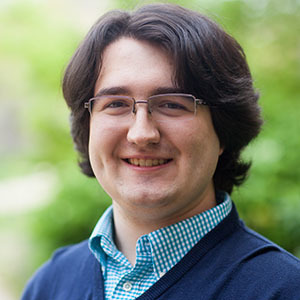
Physics graduate student Patrick Fasano has been named a member of the U.S. Department of Energy’s Office of Science Graduate Student Research Program (SCGSR). This biannual award, granted to only 52 student scientists across the country, will allow him to perform theoretical nuclear physics thesis research at the DOE-led Lawrence Berkeley National Laboratory (LNBL), predicting the properties of atomic nuclei.
“These graduate student awards help prepare new scientists for STEM careers that are vitally important to the DOE mission and the nation’s economy,” according to Secretary of Energy Dan Broulette, who was quoted in a press release as part of the announcement. “They represent the future leadership and innovation that will allow American science and engineering to excel in the 21st century.”
Fasano describes the Berkeley Lab’s National Energy Research Scientific Computing Center, where the grant award allows him to collaborate with a team of DOE scientists, as “‘the place to be’ for doing the kind of high performance computing (HPC) work that we need to answer our physics questions.”
According to Fasano’s advisor, Mark Caprio, Director of Graduate Studies and Theoretical Physics Associate Chair, “For Patrick, being able to spend time in residence with the world-class applied mathematics and computational science groups at LBNL will allow him to rapidly expand his computational skills and have access to the insights of leading experts.”
The skills Fasano gains will also give him more ways to make predictions about atomic nuclear structure, a key research interest in Professor Caprio’s lab. Currently, Fasano is working on the optimization of a new code for one of the LNBL’s massive supercomputers, developed by 2014 Notre Dame SCGSR recipient Anna McCoy (PhD ‘18).
In addition to maintaining Notre Dame connections at Berkeley, Fasano ’16 feels grateful for the bonds he has built in South Bend. He appreciates how insight from Department of Physics faculty in other areas of expertise supplemented his knowledge, while Department of Mathematics courses advanced his coding skills. In fact, personal interactions like these inspired him to enroll as a graduate student after he finished his undergraduate degree at Notre Dame.
“Notre Dame has given me a great environment to learn a lot of different things which I've ended up pulling together in my research,” he said. “I really appreciate the fact that people look out for each other and care about each others' wellbeing.”